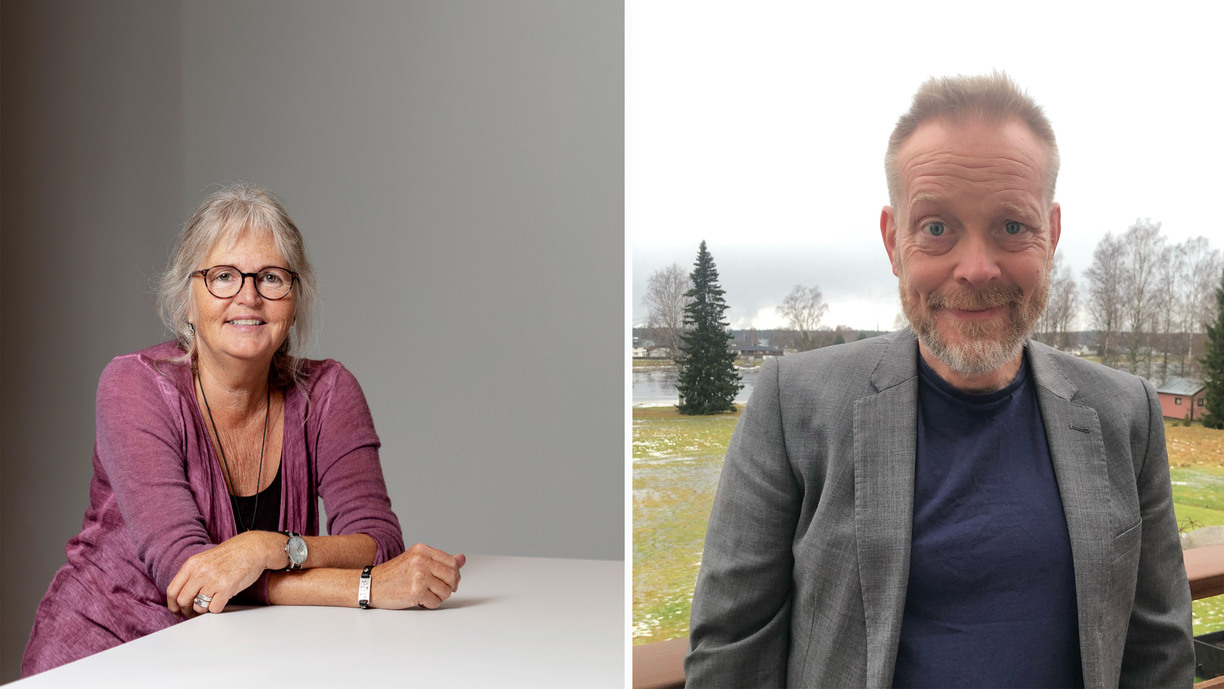
Eva Alerby and Niclas Ekberg, researchers in education.
17 October 2023
Research raises questions about distance education
In a recent study, university students were interviewed about their experiences with digitalization and distance education during the pandemic. Based on the study, researchers can draw conclusions on best practice for distance education. But above all, they want to raise discussions about deeper questions. What happens to the person as a human when learning and teaching become digitalized?
"We are interested in experiences, perceptions, and descriptions of the digitalization of education. What does this mean for our students? What does it mean for our future education? As a university, we cannot only focus on information and efficiency; there are also more existential questions about values we need to preserve and what we want education to be," says Niclas Ekberg, Senior Lecurer in Education at Luleå University of Technology and one of the researchers behind the study.
Freedom and distance
One year into the pandemic, the researchers asked 39 university students in Sweden and Iceland a series of open questions regarding experiences with the digital transformation. The participants were teacher education students at both the undergraduate and advanced levels. Under normal circumstances, they would have received their education on campus. The responses were categorized into themes and analyzed based on three different research questions: the impact of digitalized education on conditions and possibilities of learning, the importance of physical location, and the design of teaching.
Despite distance education being unvoluntary, the overall tone in the students' responses was predominantly positive. But they also expressed several challenges. One prominent theme that emerged was an increasing sense of freedom and empowerment, an opportunity to determine where, when, and how they wanted to study. However digital technology also created a distance between students and their teachers.
Eliminates gaps for social interaction
"Technology consumes time; there are no spaces for social interaction. Technology is efficient and eliminates the gaps for spontaneity and social interaction," says Eva Alerby, Professor of Education at Luleå University of Technology and co-author of the article.
The responses indicated that the classroom could exist anywhere and anytime. The personal space and the educational became intertwined. Some students appreciated this as a way to balance their life commitments, while others felt disconnected from the educational experience or lost the sense of home.
Is time really flexible?
"When digitalization creates new conditions, there is also an underlying idea that time can be stretched, which may be more of a wish than a reality. Working and studying simultaneously, taking care of children and studying: is time really that flexible? There is an obvious risk of double work and disappearing boundaries," argues Eva Alerby.
Distance education placed new demands on teachers, requiring them not to hide behind slideshows and monologues. According to the students, some teachers succeeded, while others did not. Successful teaching, according to the students, involved teachers creating variety and utilizing technology to facilitate dialogue.
Problematizes idea of efficiency
Students also used the possibilities of technology to shape their own education, such as speeding up or slowing down recorded lectures.
"The teacher became a moldable resource, an object. It's interesting to discuss what this means for the role of the teacher, what are the qualities of a teacher, and what can be done by a machine. We raise a cautionary flag that interpersonal relationships can become instrumentalized, both students and teachers becoming some sort of commodities," says Niclas Ekberg, continuing:
"We highlight areas that need to be carefully considered. We don't provide answers, but we show that we must critically and deeply examine these questions. There is a techno-optimism and an idea of efficiency that we want to problematize. But we cannot have a dystopian view of the digitalization of education either. We cannot go back; we need to learn for the future."
- Finitude unbound – on learning, space and belonging in digitalised higher education
 External link, opens in new window.
External link, opens in new window.
The article Finitude unbound – on learning, space and belonging in digitalised higher education by Niclas Ekberg, Eva Alerby, and Jórunn Elídóttir is published in the journal "Högre utbildning" (Higher Education).
Contact
Eva Alerby
- Professor and Head of Subject
- 0920-491506
- eva.alerby@ltu.se
- Eva Alerby
Niclas Ekberg
- Senior Lecturer
- 0920-492441
- niclas.ekberg@ltu.se
- Niclas Ekberg
Published:
Updated:
